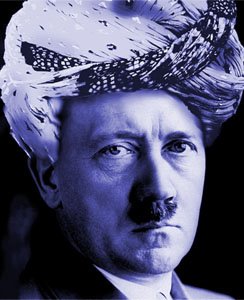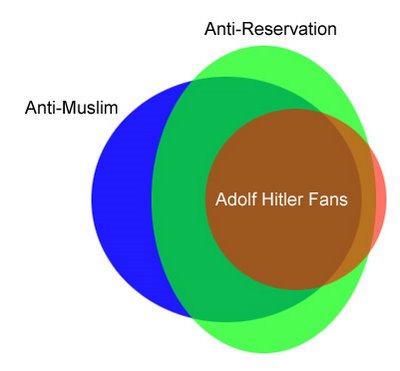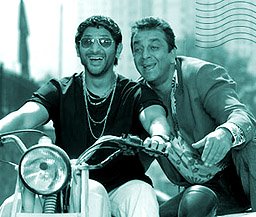 I am about to make a wild hypothesis here. I believe that of all the countries and cultures in the world, India would be hosting highest number of admirers of Adolf Hitler. I don’t have any statistical evidence and I don’t have access to an online poll either. But I am confident that if there was a poll of such sort, India would rank #1. [Later, I added an update at the bottom]
I am about to make a wild hypothesis here. I believe that of all the countries and cultures in the world, India would be hosting highest number of admirers of Adolf Hitler. I don’t have any statistical evidence and I don’t have access to an online poll either. But I am confident that if there was a poll of such sort, India would rank #1. [Later, I added an update at the bottom]
After WWII, the Allied forces spent great efforts to educate most of the warring nations the evils of Nazism (and other associated radical nationalism and fascism). The countries that lost out- Germany, Austria, Japan, etc, started growing up to new teachings where belligerent notions of fascism and nationalism were shown in negative light. Most of the modern Europe condemns everything that Nazism represents (barring some miniscule neo-Nazis scattered here and there). The whole of North America, under the influence of USA and Canada have inculcated in its people a feeling of hatred for Adolf Hitler. Japan, growing up under the influence of US and other allies, has also given up its fascination for its aggressive imperialism. Other regions like Soviet Union, China, South East Asia, East Europe, Western Europe, having suffered the war renounced everything that Nazism represented. Most of these countries hate or dislike Adolf Hitler. There is no reason why anyone in Africa would like him either (he thought they were subhuman).
Of the big geographies and populations, this leaves South America and India. While some of the countries like Brazil and Argentina did give refuge to ex-Nazis to settle down in their countries, they have, in the modern times, renounced that support (coming under pressure from other parts of the world).
This leaves India in a unique position. India did not face the war directly though many of its soldiers participated in WWII and won great victories in different parts of the world. Not only do we not relate ourselves to this war, we do not even talk about our soldier’s achievements in this war. It is more to do with our nationalistic political agenda that sought to highlight specific Indian contributions while suppressing other achievements. During WWII, our nationalist leaders coming from all ideologies (who were fighting for Independence) were not keen on supporting British overtly though many Indian soldiers recruited themselves into the war – in fact a whopping 2.5 million of them (the biggest volunteer force) participated in that war. And now for the interesting part- Japan’s biggest army defeat (till then), which actually stopped their war machine on land, was at the hands of Indian Army (under British). This happened on the Indo-Burmese border in which more than 55,000 soldiers of Japan died in a single battle. After defeating China, the whole of Indo-China, Singapore, Malaysia and Burma, the Japanese war machine looked invincible but was stopped by the Indian Army through a massive defeat! Indian soldiers player a pivotal role in WWII, and we do not even talk about it!
Why do we not glorify this achievement? There are two reasons for this. First, we are caught in a weird dilemma. Netaji Subhas Chandra Bose (who should be pardoned for his naiveté) chose to support this invading Japanese Army, renowned for its war crimes and occupation brutalities (which included rape of Manchuria and Indo-China), while the Indian soldiers were fighting this invading army on the Indian border. His support of Japanese Army puts us in a weird position. Netaji is the symbol for our aggressive movement for Independence. All those quarters and sections who were disenchanted with non-violence movement (promoted by Mahatma Gandhi) sought refuge in this militant ideology. Netaji is idolized for a strong and aggressive militant posture and most of us in India have grown up revering Netaji. Hence the contradiction- how can we glorify Indian Army under British which defeated the Japanese Army supported by Netaji and his INA? Conveniently, we decided to completely ignore our participation, role and involvement in WWII and instead chose to highlight achievements of INA (Indian National Army). Who cares if some hundreds of thousands of nameless Indians died in this war? We wanted our idols (in Netaji and INA) and we got them. As a conscious decision, Indian people and its government chose to highlight the not-so-grand achievements of INA and Subhas Chandra Bose while meticulously ignoring the momentous achievements of Indian soldiers in WWII.
Second, we are fascinated with anyone approving anything Indian. Most Indians look way back into past, almost thousands years back, searching for moments of glory and grandeur, which is starkly missing in the contemporary history. Indians are extremely proud of their ancestry and wallow and bask in the dim warmth the ancient glory provides. The present is far too depressing lacking in any achievements. So, if any foreign country or people or author show respect for our ancient history and our past contributions, we just love it. We love Germany, not because we are related to them in anyway but because they included us in some weird research of theirs to conclude that Indians are Aryans and Germans are Aryans too. For once, we got a chance to be proud that such ‘great culture and country like Germans’ are in fact our brothers. Don’t we all know that even the infamous Swastika is borrowed from us? Lacking in formal exposure and education to events of WWII, many Indians do not know the exact crimes committed by Nazis, and even if they do, they completely ignore it the way they desensitize themselves to all the miseries of India- roadside begging kids, colossal garbage piling up next to their home, dying people from malnutrion, etc. We have developed a habit of conveniently shutting our senses when we want to. We developed a glorified image of Adolf Hitler and we see only the positives of Nazi regime- like fastest industrial growth, discipline of their armies and execution, fast paced occupation, and enmity towards British (who were our rulers). Adolf Hitler’s ‘Mein Kampf’ is sold everywhere in India and is one of the popular books amongst college going students. Nowadays, we have restaurants and brands named after Adolf Hitler. Many Indians, both young and old, admire and glorify Adolf Hitler and many vouch that someone like him is required for India to correct things. I have not seen this much fascination and admiration for Adolf Hitler in any other community, culture or society.
In addition to the above hypothesis, I would like to make another far-fetched conjecture. I believe that there is a great correlation between the groups who admire Adolf Hitler, the groups who hate or think low of Muslims, and those who are against reservations. Here, I constructed a small picture to illustrate this correlation.
What are Anti-Muslim sentiments?
There are many Indians, especially Hindus, who feel there is something wrong with Muslims. These negative sentiments come in different gradations- from mere dislike or contempt to downright hatred.
How are these feelings expressed? Say, you tell someone that you have a Muslim roommate. The reaction is- “Really? How come? Did you not find anyone else?” OR something like, “So, do you guys get along?” A person who has a good experience with a Muslim officer/attendant comes home to relate it- “Though he was a Muslim, he was really nice to me. He helped me out today”. There is an innate assumption that they are not friendly and that you can’t get along with them - and those you can get along are exceptions. Another person says, “I have a Muslim friend. But he is very different though. He does not go to Mosque and all that. He is not a typical Muslim. He is very good.” The prevailing feeling is that devout and typical Muslims are somehow not easy to get along. On the other extreme are people who think that most of the evils of Indian society exist because of Muslims (very synonymous to how Nazis blamed certain sections of people for all evils of their society). They believe that Muslims should have gone to Pakistan during Partition- and they even blame Mahatma Gandhi and other founding fathers for allowing them to stay back in India. Most of them complain that our minorities are unnecessarily pandered and believe that excessive concessions are doled out to them.
Most moderate Hindus may not harbor much ill-will but they are fine as long as they see a Muslim as a grocer, a laborer, or auto-driver, but not in their regular life. Their attitude is more like – “Well, they exist, but not in our midst. Let’s keep it that way”. Just ask yourself, how many Muslims do you see in any of the top colleges or IT companies? Do they comprise 12-14% as our demographics suggest? (In my experience, most often they constitute less than 1%). How many of them are in your apartment complex?
Those who hate Muslims find their voice and expression in some of the political and militant outfits- like VHP, RSS, Bajrang Dal, Shiv Sena and the BJP. Is it a coincidence that these groups comprise mostly upper caste leaders? Also, just look at the well-to-do NRI lobbies in US – most of them are anti-Muslim. (According to my experiences, around 90% of Indians living in US share negative sentiments towards Muslims.)
Most of this hatred is founded in the following:
▪ Feeling of superiority (based on certain attributes of birth, legacy and history)
▪ Fear of other types of people – other religions and caste
▪ Lack of familiarity with other types of people, their culture, their mannerisms, their dress sense, language, family lifestyle, etc.
Most chaste Hindu communities forbid their kids mingling closely with Muslim kids. The Muslims go to different kind of schools and somehow are not part of the mainstream. It’s as if they are living in a different India altogether. The IT revolution which brought many Hindus to cities like Bangalore somehow seems to have completely skipped this community. The villages in Hindu also have distinct hierarchy towards these communities akin to the Indian caste system. The history also suggests that majority of the Muslims converted from lower castes in India.
What are Anti-reservations views?
These are harbored by most upper caste Hindus in India. According to my experiences, almost 80% of Indian upper caste seems to hold anti-reservation views- ranging from overt protests to mild disapprobation. The remaining 20% are labeled socialists and communists and hence dismissed as exceptions. The sentiments range from- “No, there should be no reservations based on caste”, to “Yes, there should be reservations even for poor upper caste”. An upper-caste Hindu confesses - “I didn’t know his caste till yesterday and I was happily friends with him. But yesterday I got to know that he belongs to lower caste (because of ‘reservations’ issue) and now I feel differently about him”. Many from this group believe that they held the upper-caste status because they were better off in mental faculties while the menial jobs were relegated to other castes – and since they were superior it was natural that this segregation should have happened (very similar to Nazi ideology that certain races are superior and hence should have access to more resources). They rationalize their higher presence in universities and employment stating that they are meritorious and hence deserving. There is an innate belief that some castes are superior to others because they have certain attributes passed on hereditarily (or genetically?). And this belief is conveniently codified into our religion itself.
Ideas of Adolf Hitler, that certain groups are superior to others and hence deserve better, that ‘other kind’ of people are inferior and hence need to give up resources, that a certain section is to be blamed for all evils of society, are reflected in both anti-reservation sentiments and anti-Muslim feelings. Modern India is witnessing a growing sense of superiority complex in most upper-caste Hindus. These sentiments are being fueled by many political outfits and associated organizations (like RSS, BJP, VHP, Bajrang Dal, Shiv Sena, etc) which blatantly foment Hindu supremacist ideology; they are also supported and encouraged by elite Indian media which is comprised of upper-caste Hindus; and most unfortunately, a large section of educated Indians, in their attempt to rediscover India’s superior contributions by showcasing how our religion, history and sciences were always superior to that of West (no wonder they attempt to equate Vedas to modern science) also fuel these supremacist sentiments including anti-reservations protests. No wonder I see a great correlation between these groups- those who admire and revere Adolf Hitler, those who oppose reservations, and those who dislike Muslims.
I could be completely wrong in my hypothesis. If any statistics or surveys prove that I am wrong, I would be the happiest. But if the surveys indeed prove that I am closer to being right, then there is a far greater danger- that most of our prejudices are coming from the same innate belief system which is based on a sense of supremacy, fear of unknown and intolerance of diversity. This only means we have much bigger problems ahead in this country. If we do not tackle these issues consciously as a society, we will be forced into another surgical procedure or a civil war- far bloodier than any thing we have experienced in our history.
Update: (22 Dec 2006)
An article, "Hitler the trendy tyrant in India", says- In Gujarat, textbooks have praised Hitler's leadership abilities, fascism and the Nazi movement. Until recently, state social studies textbooks have featured chapters on "Hitler, the Supremo" and "Internal Achievements of Nazism." The textbooks have been changed slightly this year but still barely mention the Holocaust.
Update: (29 Sep 2006)
Update: (10 Sep 2006)
A recent article in the Times of India, Mumbai reported on a poll of students from India's premier academic institutions about the country's political future. 17% of the students polled, favoured Hitler as the ideal model for the kind of leader India ought to have. The present Prime Minister, Atal Bihari Vajpayee, was ahead of Hitler at number two and oddly, Gandhi ranked number one. Hitler represented discipline, efficiency and nationalism to the students (Times of India, Mumbai, December 26, 2002).


